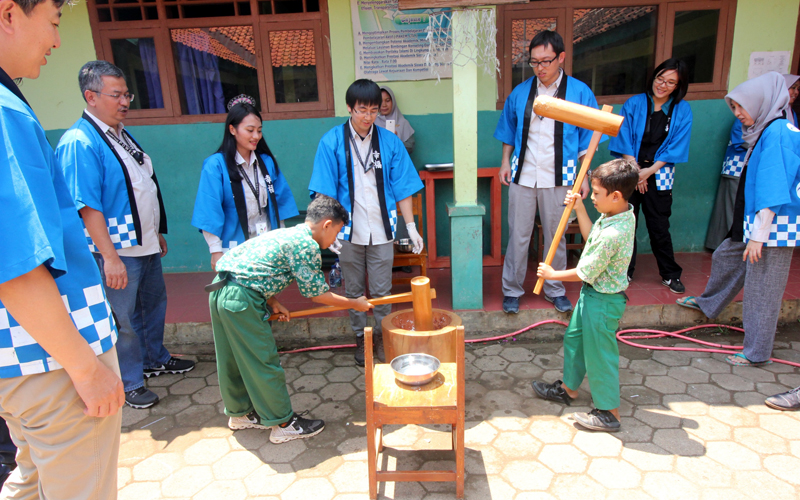PT BPI Invites Ujungnegoro Students to Join Mochi Making Class

The visit of experts from the Sakura country to a number of Elementary Schools (SD) and Madrasah Ibtidaiyah (MI) around the construction of the Central Java 2 x 1,000 MW power plant, continues to be improved. One of them was a visit to MI Al-Ikhsan Ujungnegoro, the technical experts working at PT Bhimasena Power Indonesia gave a special lesson.
The students were very enthusiastic and proud, after the experts from the Land of the Rising Sun entered the class prepared by the school. With Japanese traditional clothes, they shared their knowledge, traditional games and culture with the students and made traditional Japanese food, Mochi.
"Mochitsuki" class, students will be taught how to make mochi cakes, made from glutinous rice, red beans and refined sugar. The process of making this cake is not merely making a cake, but it teaches a togetherness and solidarity in the activities.
The students worked hand in hand, taking turns to pound the sticky rice that had been prepared in a wooden mortar. Togetherness and teamwork (teamwork) of students, making sticky rice will be smooth and sticky. Then formed into dots like a ball, and sprinkled with red beans and refined sugar.
Yuta Aoki, said that Mochi is one of the traditional Japanese foods made for traditional celebrations in Japan, which is mochitsuki or new year celebration for nobles. "It has become a tradition in Japanese society when celebrating the new year event is required to provide mochi as a snack," said Aoki, Project Finance Development Manager of PT Bhimasena Power Indonesia.
Further explained, that mochitsuki is a traditional way of making mochi cakes using a wooden hammer to pound sticky rice that has been prepared in a stone or wooden container. Although this cake is from Japan, mochi is also popular in China, Taiwan, Cambodia, Hawaii, South Korea, and Thailand.
Mochitsuki, instill the value of cohesiveness or "teamwork" so that each other can work together in achieving a goal.
Before students learn to make mochitsuki, they receive prior knowledge about Japan, its culture and climate. They are also taught traditional Japanese games, namely the art of folding paper (origami), and jumping rope games (nawatobi).
Ary Wibowo, as GM External Relations of PT BPI explained that this Japanese Class was a routine program of PT Bhimasena Power Indonesia for students closest to the power plant location. By sharing the culture that the source brings directly, it is hoped that it can motivate students to be more active in learning, discipline and sharpening creativity in a fun way.
"Batang CFPP will continue to side by side with the community as neighbors so that we have the potential, we want to share with the community to be more useful, for example the potential that is owned by workers from Japan to be able to share knowledge with students."
Meanwhile, Reza, one of the 5th grade students of MI Al-Ikhsan Ujungnegoro said that this activity was fun and could meet expatriates, he hoped that this activity would continue. "This activity is fun, happy to meet directly with the Japanese, they are friendly, come back tomorrow, yes," he said, shaking hands with the experts from PT BPI.


